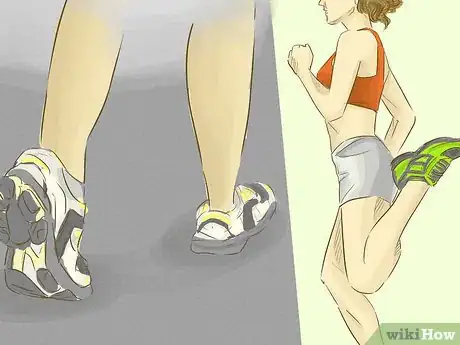This article was medically reviewed by David Nazarian, MD. Dr. David Nazarian is a board certified Internal Medicine Physician and the Owner of My Concierge MD, a medical practice in Beverly Hills California, specializing in concierge medicine, executive health and integrative medicine. Dr. Nazarian specializes in comprehensive physical examinations, IV Vitamin therapies, hormone replacement therapy, weight loss, platelet rich plasma therapies. He has over 16 years of medical training and facilitation and is a Diplomate of the American Board of Internal Medicine. He completed his B.S. in Psychology and Biology from the University of California, Los Angeles, his M.D. from the Sackler School of Medicine, and a residency at Huntington Memorial Hospital, an affiliate of the University of Southern California.
There are 19 references cited in this article, which can be found at the bottom of the page.
This article has been viewed 26,459 times.
Immunity is the ability of the body to fight diseases and disease-causing pathogens. Some factors that lead to depletion in immune power in the body are stress, depletion in nutrition uptake, aging, surgery, and social isolation. Increasing your immunity can be beneficial for not only warding off illness, but also making you feel better in general. The best way to increase your immunity is eating healthy, reducing your stress, and sleeping and exercising regularly. While you can’t control everything about your immune system, doing your best to increase your immune system will make you healthier.
Steps
Eating Healthy to Increase Your Immune System
-
1Eat more fruits and vegetables.[1] Fruits and vegetables have a lot of vitamins and nutrients, like Vitamin A and Vitamin C, that boost your immunity. They are also rich in antioxidants, which increase your oxygen level.
- Fruits like berries and oranges are rich in Vitamin C, which helps the immune system function more efficiently.
- Carrots, garlic, and spinach contain beta carotene, and Vitamin E.
-
2Stay hydrated. Drinking plenty of water can raise immunity levels in your body. Water flushes toxins out of your blood and helps with the digestion of food.[2]
- Water also helps the body produce lymph, which carries white blood cells around your body to flight illness.
- Your body also uses water to clean your eyes and body to keep away any disease-causing microbes.
Advertisement -
3Eat plenty of yogurt. Yogurt is especially good for boosting your immune system. However, dairy products can be detrimental to your immune system, so don’t consume too much milk and cheese.
- Yogurt contains probiotics, which strengthen the immune system and can help you fight off colds.[3]
-
4Consume moderate amounts of complete protein. You can find complete protein in foods such as eggs, fish, and shellfish. These proteins can help build the amino acids in your body.
- These proteins are better for you than fatty proteins and red meat, which can also have negative effects on your immune system.
-
5Try whole grains. Oats and barley, in particular, can boost your immunity and may make antibiotics work more effectively. Whole wheat foods can also be beneficial in contrast to breads with less rich substance.[4]
- Whole grains contain benzoxazinoids or BX, which is a substance that can boost your immune system by subduing bacteria.[5]
-
6Avoid sweetened drinks. Drinks like artificially sweetened juice and cola can dehydrate you. Unlike water, these drinks act like food and need water to remove excess waste left over after digestion.
-
7Stay away from alcohol. Alcohol can actually suppress your immune system, especially during any binges or when you are already sick. Chronic alcohol use can also lead to long-term diseases.[8]
- Moderate alcohol use, such as a daily glass of red wine, can improve your immune system. However, that's often because of the other chemicals in alcoholic beverages and not the alcohol itself.[9]
Reducing Your Stress to Increase Your Immune System
-
1Use good stress to become energized. Before important events, you may experience good stress that boosts your energy level. As long as this stress doesn't become chronic, it can be beneficial for your immune system.[10]
-
2Meditate a few minutes everyday. You can use meditation to slow your heart rate and lower your blood pressure. Sit for a few minutes with your eyes closed, letting any distracting thoughts leave you.[11]
-
3Talk to your friends and family about stressors. Reaching out to others can help you to feel better about the stress in your daily life. Have a confidante you can talk to will make you feel less alone and less stressed.
-
4Listen to music. Music can lower your heart rate and blood pressure, especially if it's relaxing music. Relaxing music can also make you feel less anxious, which helps to improve your immune system.[12]
- Up tempo music can also be beneficial to your health. Like good stress, up tempo music can help you to blow off steam as a temporary relief.
-
5Have fun and laugh often. Laughter can reduce your stress level. It also soothes tension, stimulates your organs, and increases your blood pressure in a healthy way.[13]
-
6Think of things in perspective. Stress can get worse if your problems feel overwhelming. Reframe any stressors so you can reduce their impact on your sense of well-being.[14]
- When you're feeling overwhelmed, remember that it will eventually pass and you will feel less overwhelmed in the future.
Getting Enough Sleep and Exercise
-
1Get enough sleep every night.[15] Sleep helps to restore your body and keep your immune system strong. Keeping your body well rested will help you to stay healthy. [16]
- The amount of sleep you need depends upon your age. Younger children and teenagers need more than 7-9 hours of sleep, whereas people over 55 often need less. On average, it's best to sleep 7-9 hours per night.
-
2Avoid sleep deprivation. When you don't get enough sleep, your T-cells go down. This can make it easier for you to catch a cold or the flu.[17]
- Lack of sleep can make it more likely you'll get a fever as well.
- Sleep deprivation can make vaccines, such as the flu vaccine, less effective in preventing illness.
-
3
-
4Make sure to not overdo exercising. Too much exercise can actually temporarily hurt your immune system.Since your body needs to recover from intense exercise, your immune system's defenses may not be as strong after more strenuous exercise.[22]
- If you're just had an intense workout, like a marathon, stay away from anybody who is sick, since you are more susceptible after exercising.
- Anytime you feel a little ill, stay away from intense exercise. It may make you more likely to become ill if you ignore your body's warning and work out anyway.
References
- ↑ David Nazarian, MD. Diplomate, American Board of Internal Medicine. Expert Interview. 26 March 2020.
- ↑ http://www.fitday.com/fitness-articles/nutrition/healthy-eating/5-immune-system-benefits-of-drinking-water.html
- ↑ http://www.webmd.com/food-recipes/benefits-yogurt
- ↑ http://www.prevention.com/food/healthy-eating-tips/power-foods-that-boost-immunity/2-oats-and-barley
- ↑ http://sciencenordic.com/whole-grains-boost-immune-system
- ↑ David Nazarian, MD. Diplomate, American Board of Internal Medicine. Expert Interview. 26 March 2020.
- ↑ http://www.askdrsears.com/topics/feeding-eating/family-nutrition/foods-to-boost-immunity/4-habits-weaken-immune-system
- ↑ http://pubs.niaaa.nih.gov/publications/10report/chap04b.pdf
- ↑ http://www.medicalnewstoday.com/articles/270379.php
- ↑ http://adrenalfatiguesolution.com/stress-immune-system/
- ↑ http://www.webmd.com/balance/guide/blissing-out-10-relaxation-techniques-reduce-stress-spot
- ↑ http://www.webmd.com/balance/guide/blissing-out-10-relaxation-techniques-reduce-stress-spot?page=2
- ↑ http://www.mayoclinic.org/healthy-lifestyle/stress-management/in-depth/stress-relief/art-20044456
- ↑ https://www.psychologytoday.com/blog/finding-cloud9/201308/5-quick-tips-reduce-stress-and-stop-anxiety
- ↑ David Nazarian, MD. Diplomate, American Board of Internal Medicine. Expert Interview. 26 March 2020.
- ↑ https://sleepfoundation.org/how-sleep-works/how-much-sleep-do-we-really-need/page/0/1
- ↑ http://www.webmd.com/sleep-disorders/excessive-sleepiness-10/immune-system-lack-of-sleep
- ↑ David Nazarian, MD. Diplomate, American Board of Internal Medicine. Expert Interview. 26 March 2020.
- ↑ https://www.nlm.nih.gov/medlineplus/ency/article/007165.htm
- ↑ http://www.prevention.com/fitness/how-much-exercise-you-really-need
- ↑ http://www.livescience.com/9877-losing-weight-helps-immune-system.html
- ↑ http://well.blogs.nytimes.com/2009/10/14/phys-ed-does-exercise-boost-immunity/?_r=0
-Step-8-Version-3.webp)


















-Step-17-Version-2.webp)













-Step-17-Version-2.webp)






































Medical Disclaimer
The content of this article is not intended to be a substitute for professional medical advice, examination, diagnosis, or treatment. You should always contact your doctor or other qualified healthcare professional before starting, changing, or stopping any kind of health treatment.
Read More...